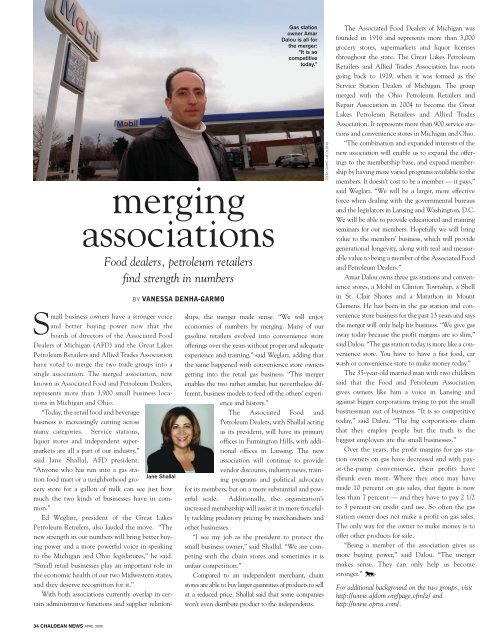APRIL 2006
cn0406_0156
cn0406_0156
Create successful ePaper yourself
Turn your PDF publications into a flip-book with our unique Google optimized e-Paper software.
merging<br />
associations<br />
Food dealers, petroleum retailers<br />
find strength in numbers<br />
BY VANESSA DENHA-GARMO<br />
Gas station<br />
owner Amar<br />
Dalou is all for<br />
the merger:<br />
“ It is so<br />
competitive<br />
today.”<br />
Small business owners have a stronger voice<br />
and better buying power now that the<br />
boards of directors of the Associated Food<br />
Dealers of Michigan (AFD) and the Great Lakes<br />
Petroleum Retailers and Allied Trades Association<br />
have voted to merge the two trade groups into a<br />
single association. The merged association, now<br />
known as Associated Food and Petroleum Dealers,<br />
represents more than 3,900 small business locations<br />
in Michigan and Ohio.<br />
“Today, the retail food and beverage<br />
business is increasingly cutting across<br />
many categories. Service stations,<br />
liquor stores and independent supermarkets<br />
are all a part of our industry,”<br />
said Jane Shallal, AFD president.<br />
“Anyone who has run into a gas station<br />
food mart or a neighborhood gro-<br />
Jane Shallal<br />
cery store for a gallon of milk can see just how<br />
much the two kinds of businesses have in common.”<br />
Ed Weglarz, president of the Great Lakes<br />
Petroleum Retailers, also lauded the move. “The<br />
new strength in our numbers will bring better buying<br />
power and a more powerful voice in speaking<br />
to the Michigan and Ohio legislatures,” he said.<br />
“Small retail businesses play an important role in<br />
the economic health of our two Midwestern states,<br />
and they deserve recognition for it.”<br />
With both associations currently overlap in certain<br />
administrative functions and supplier relationships,<br />
the merger made sense. “We will enjoy<br />
economies of numbers by merging. Many of our<br />
gasoline retailers evolved into convenience store<br />
offerings over the years without proper and adequate<br />
experience and training,” said Weglarz, adding that<br />
the same happened with convenience store owners<br />
getting into the retail gas business. “This merger<br />
enables the two rather similar, but nevertheless different,<br />
business models to feed off the others’ experience<br />
and history.”<br />
The Associated Food and<br />
Petroleum Dealers, with Shallal acting<br />
as its president, will have its primary<br />
offices in Farmington Hills, with additional<br />
offices in Lansing. The new<br />
association will continue to provide<br />
vendor discounts, industry news, training<br />
programs and political advocacy<br />
for its members, but on a more substantial and powerful<br />
scale. Additionally, the organization’s<br />
increased membership will assist it in more forcefully<br />
tackling predatory pricing by merchandisers and<br />
other businesses.<br />
“I see my job as the president to protect the<br />
small business owner,” said Shallal. “We are competing<br />
with the chain stores and sometimes it is<br />
unfair competition.”<br />
Compared to an independent merchant, chain<br />
stores are able to buy larger quantities of products to sell<br />
at a reduced price. Shallal said that some companies<br />
won’t even distribute product to the independents.<br />
PHOTO BY DAVID REED<br />
The Associated Food Dealers of Michigan was<br />
founded in 1916 and represents more than 3,000<br />
grocery stores, supermarkets and liquor licenses<br />
throughout the state. The Great Lakes Petroleum<br />
Retailers and Allied Trades Association has roots<br />
going back to 1929, when it was formed as the<br />
Service Station Dealers of Michigan. The group<br />
merged with the Ohio Petroleum Retailers and<br />
Repair Association in 2004 to become the Great<br />
Lakes Petroleum Retailers and Allied Trades<br />
Association. It represents more than 900 service stations<br />
and convenience stores in Michigan and Ohio.<br />
“The combination and expanded interests of the<br />
new association will enable us to expand the offerings<br />
to the membership base, and expand membership<br />
by having more varied programs available to the<br />
members. It doesn’t cost to be a member — it pays,”<br />
said Weglarz. “We will be a larger, more effective<br />
force when dealing with the governmental bureaus<br />
and the legislators in Lansing and Washington, D.C.<br />
We will be able to provide educational and training<br />
seminars for our members. Hopefully we will bring<br />
value to the members’ business, which will provide<br />
generational longevity, along with real and measurable<br />
value to being a member of the Associated Food<br />
and Petroleum Dealers.”<br />
Amar Dalou owns three gas stations and convenience<br />
stores, a Mobil in Clinton Township, a Shell<br />
in St. Clair Shores and a Marathon in Mount<br />
Clemens. He has been in the gas station and convenience<br />
store business for the past 13 years and says<br />
the merger will only help his business. “We give gas<br />
away today because the profit margins are so slim,”<br />
said Dalou. “The gas station today is more like a convenience<br />
store. You have to have a fast food, car<br />
wash or convenience store to make money today.”<br />
The 35-year-old married man with two children<br />
said that the Food and Petroleum Association<br />
gives owners like him a voice in Lansing and<br />
against bigger corporations trying to put the small<br />
businessman out of business. “It is so competitive<br />
today,” said Dalou. “The big corporations claim<br />
that they employ people but the truth is the<br />
biggest employers are the small businesses.”<br />
Over the years, the profit margins for gas station<br />
owners on gas have decreased and with payat-the-pump<br />
convenience, their profits have<br />
shrunk even more. Where they once may have<br />
made 10 percent on gas sales, that figure is now<br />
less than 7 percent — and they have to pay 2 1/2<br />
to 3 percent on credit card use. So often the gas<br />
station owner does not make a profit on gas sales.<br />
The only way for the owner to make money is to<br />
offer other products for sale.<br />
“Being a member of the association gives us<br />
more buying power,” said Dalou. “The merger<br />
makes sense. They can only help us become<br />
stronger.”<br />
For additional background on the two groups, visit<br />
http://www.afdom.org/page.cfm/2/ and<br />
http://www.oprra.com/.<br />
34 CHALDEAN NEWS <strong>APRIL</strong> <strong>2006</strong>

















